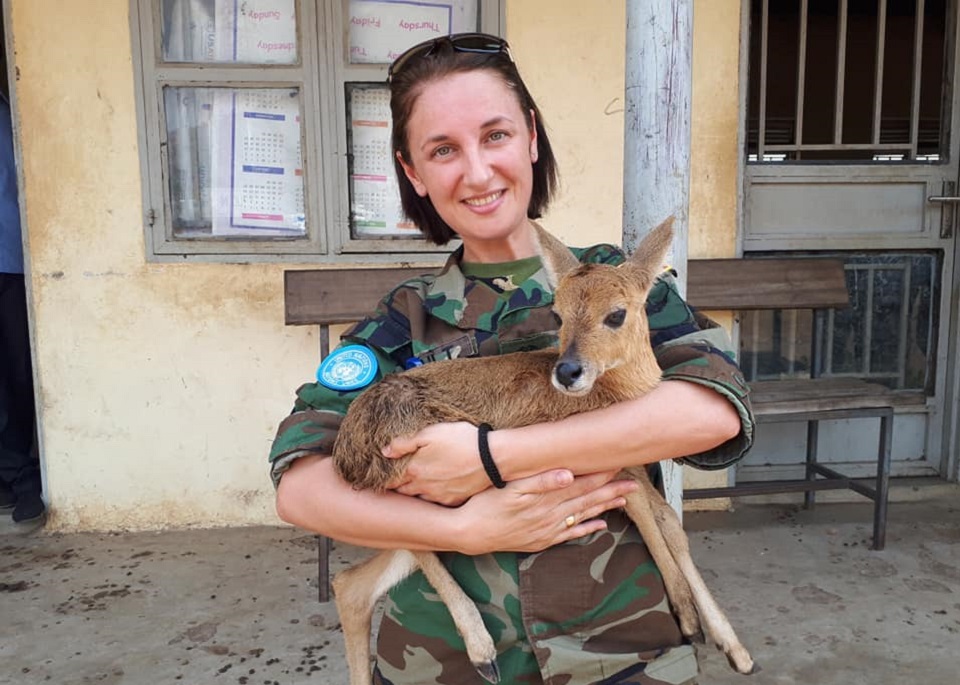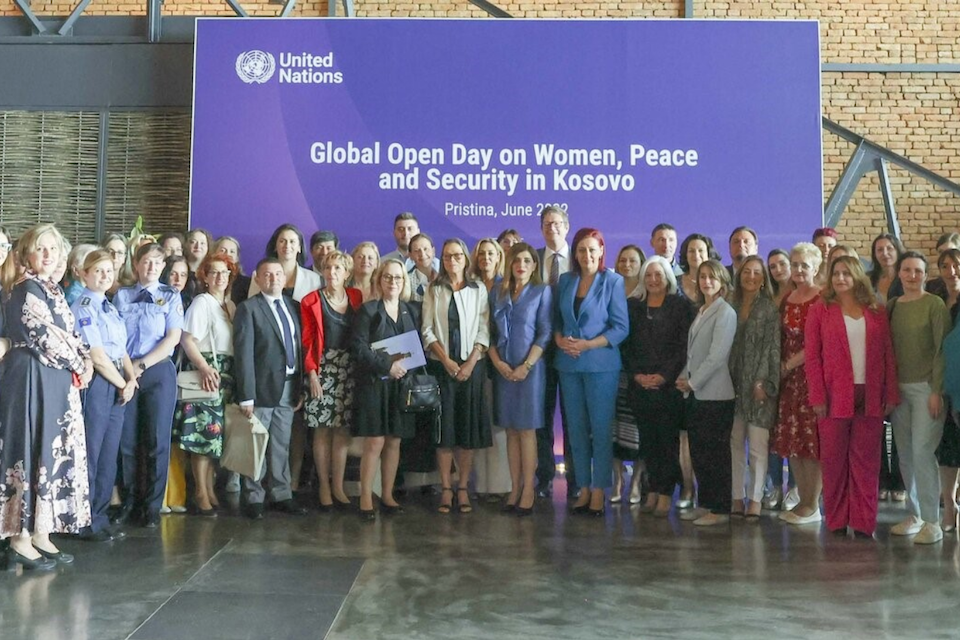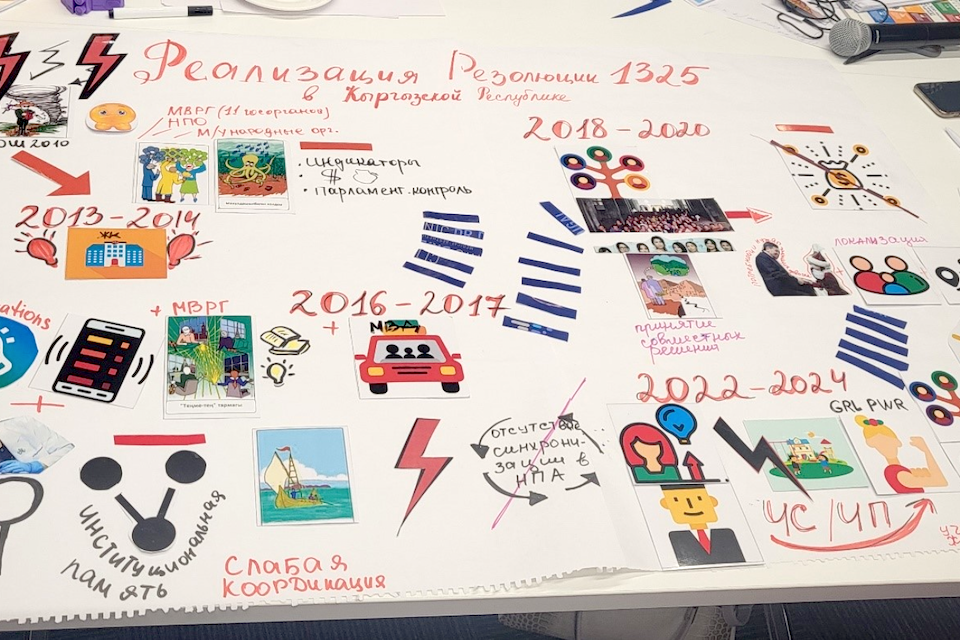More resources:
- WPS Global norms and standards
- UN Women WPS In Focus
- UN Women’s WPS Dashboard
[1] All references to Kosovo should be understood to be in the context of United Nations Security Council resolution 1244 (1999).

Peace is a prerequisite for equality, human security, and sustainable development. Placing women and girls at the centre of peace processes is critical if we are to build a more resilient and equal world and if we are to weather other crises in the future.
In October 2020, the UN Security Council marked two decades since the landmark resolution 1325, which for the first time, enshrined the essential role of women in securing and maintaining peace. The 20th anniversary of the UN Security Council resolution 1325 took place in a world where 2 billion people live in countries affected by conflict. There are more than 100 armed conflicts in the world today, and that as respect for gender equality declines, violence rises1. Half a billion people in over 20 countries and territories are affected by protracted crises and conflicts. In these countries, women continue to work against tremendous odds to build and sustain peace. They do so even during the COVID-19 pandemic but continue to be sidelined. In conflict-affected countries, women’s representation in COVID-19 taskforces stands at a low 18 per cent.
The war in Ukraine started by Russian Federation on 24 February 2022 continues to stay as the overarching challenge affecting the development and security in the region. The Russian Federation’s invasion of Ukraine marked the start of the largest displacement and refugee crisis in Europe since 1945 and the greatest modern challenge to the global peace architecture – as of 18 July 2023 5,858,000 Ukrainian refugees are recorded across Europe and 6,221,000 Ukrainian refugees registered globally2. Out of 35.6 million people living in Ukraine, 17.6 million people – nearly 50 percent of the estimated population currently living in the country – are estimated to be in need of multisectoral humanitarian assistance in 2023.3 Evidence shows that gender gaps are re-enforced in times of conflict and uncertainties, and the ongoing security turmoil is no exception. Surging threats to security, displacements and emergencies continue to reverse generational gains in women’s rights. Learn more about gendered impact of the war in Ukraine here.
The promise of the women, peace and security (WPS) agenda provides a framework for sustainable peace amidst a global crisis, and it is powered by a fearless women’s movement that knows few bounds. But, while the agenda has strong support from governments all over the world, that support hasn’t plugged the persistent implementation gaps.

Women’s leadership in building peaceful and inclusive societies has never been more urgent. However, progress in implementing the women, peace and security agenda remains uneven in the UN Economic Commission for Europe (UNECE) region. See a snapshot of where we are with the WPS agenda in the region.
In 2022 UN Women reported a reversal in the five goals of the UN SG on WPS for the decade ahead. Military expenditures globally set a new record in 2022, reaching $2.24 trillion4. In 2022, the number of conflict-affected deaths reached a 28-year high5. Women’s representation in UN-led peace talks dropped to 19 percent, compared to 23 percent the year before. Bilateral aid to women’s organizations in conflict-affected countries decreased to 150 million in 2020, compared to 181 million the year before. In his 2022 report on women, peace and security, the Secretary-General positions the unconditional defense of women’s rights and the protection of women human rights defenders as central pillars of the UN’s peace and security work. In his New Agenda for Peace, he recommended to “Introduce concrete measures to secure women’s full, equal and meaningful participation at all levels of decision-making on peace and security; commit to the eradication of all forms of gender-based violence and enact robust and comprehensive legislation, including on gender-based hate speech, tackle impunity for perpetrators and provide services and protection to survivors; and provide sustained, predictable and flexible financing for gender equality; to allocate 15 per cent of official development assistance to gender equality, and provide a minimum of 1 per cent of ODA in direct assistance to women’s organizations, especially grass-roots groups mobilizing for peace”. UN Women supports the call for action emanating from the United Nations leadership and the feminist organizations on the ground: disarmament, arms control and shifting military spending to social investment.

16 out of 18 UN programme countries in the ECA region have/had their National Action Plan on WPS. In 2022, UN Women supports countries to take took steps to localize the WPS Agenda as a part of implementation of their NAP 1325 (Georgia, Kyrgyzstan, Moldova, Ukraine, etc.). UN Women also provides support to its partners to share experiences and best practices to advance their NAPs implementation. Please see the NAP that are now being implemented with more to come:
In 2022, key stakeholders involved in the peacebuilding process accessed opportunities and tools to increase their knowledge and understanding of WPS. This includes over 450 women peacebuilders, mediators, activists, women leaders, women’s organizations, and diverse stakeholders who enhanced their awareness of the agenda through dialogues on WPS at the regional and global levels. These dialogues contributed to new commitments, including through the Compact on WPS and Humanitarian Action (WPS-HA). Learn Summary of Discussions: Reinforcing Women, Peace and Security in ECA region - How COMPACT on WPS-Humanitarian Action can translate commitments into results? conducted in October 2022 and focusing how to channel commitments and resources to address WPS-HA gaps in Europe and Central Asia.
CSOs, women organizations, and activists from different geographic and age backgrounds grew in their ability to advance WPS priorities through dialogue and knowledge sharing. In 2022, 40 youth activists and youth organization representatives strengthened their networking and improved their understanding on Youth, Peace and Security at the first regional youth forum, organized with UN Women support. Additionally, 68 Afghan women from Central Asia and Türkiye enhanced their skills, learning, and self-confidence to engage in dialogue with strategic peace actors. 37 experts from across Central Asia and seven Afghan women activists also worked towards implementation of the WPS Agenda in Central Asia during a two-day interactive dialogue organized by UN Women ECARO in December 2022. In the Republic of Moldova, an informal Women’s Advisory Board (WAB) was set-up with a support of UN Women to facilitate women’s meaningful participation in peace processes, by bringing the voice of women from communities to the formal process of conflict negotiations on the Transnistrian Settlement. The informal WAB is comprised of 14 women CSO representatives/or independent experts equally representing both banks of Nistru river. The membership of the WAB is diverse which is gathering experts and advocates for the rights of women from rural areas, women with disabilities, Roma women, youth and have different expertise and experience from peace and security work to community mobilization, protection of women from gender based and domestic violence.
UN Women continued to support the Kosovo[1] Government Commission responsible for the verification and recognition of the status of survivors of conflict-related sexual violence (CRSV) which received 1,781 applications since its establishment in 2018. As of September 2022, 1,322 applicants (1,261 women and 61 men) had been granted survivor status. By now, out of 1,938 of applications 1,428 were recognized, 253 rejected and remaining applications are in the process of review. The Commission remains an important partner in UN Women’s mission to advance the WPS agenda.
In Tajikistan, 52 CSOs identified a further engagement into NAP 1325 monitoring and evaluation, advocacy and awareness raising among media how to address tensions and risks of conflicts, a training on the peacebuilding basics as well as establishment of the peacekeeping women’s groups at the cross-borders as their priorities. Also, CSOs agreed on a set of standard/minimum actions in emergency situations.
The progress has been too slow, although the evidence is clear: when women are at the negotiating table, peace agreements are more likely to last 15 years or longer. And yet, as of 2019, peace agreements with gender equality provisions increased from 14 per cent in 1995 to only 22 per cent. On average, women were 13 per cent of negotiators, 6 per cent of mediators, and 6 per cent of signatories in major peace processes between 1992 and 2019.
More resources:
[1] All references to Kosovo should be understood to be in the context of United Nations Security Council resolution 1244 (1999).